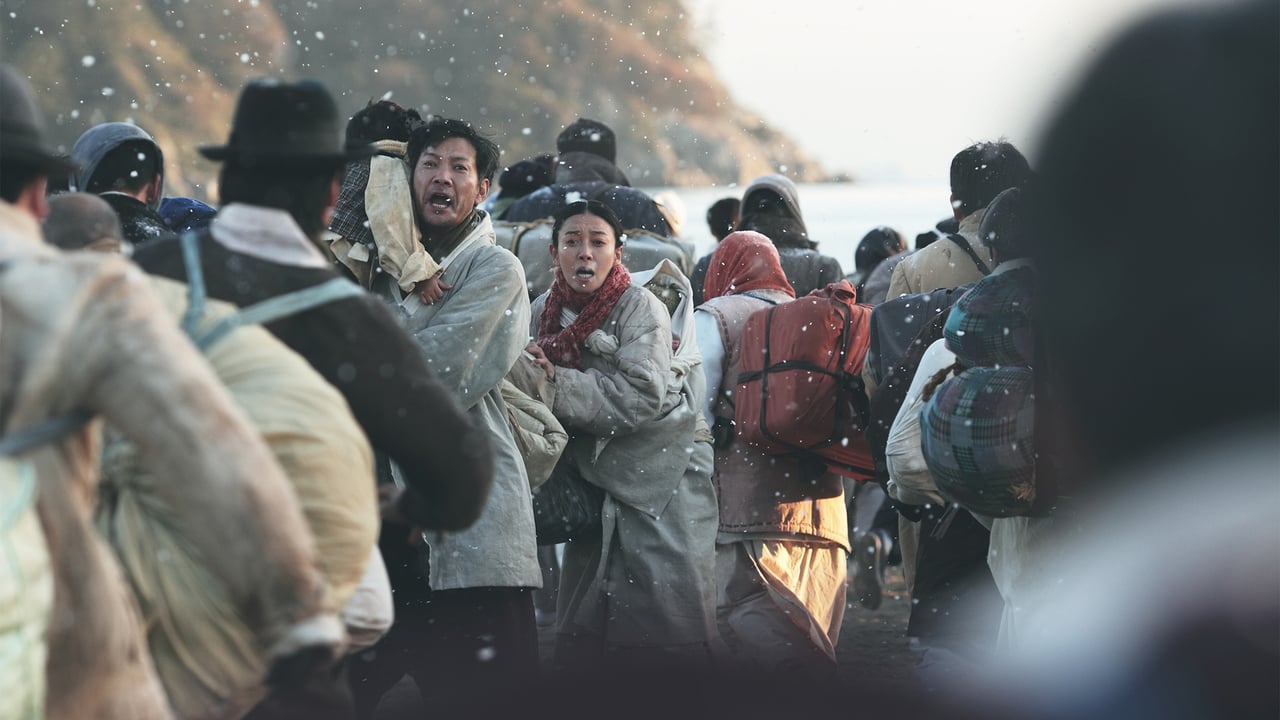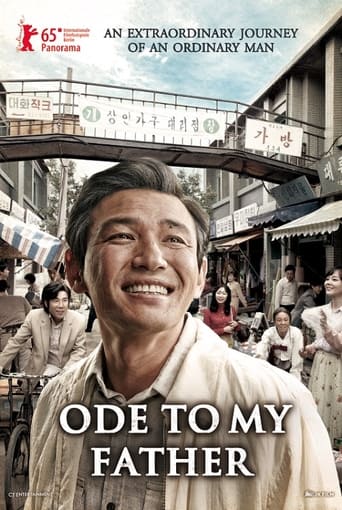denis888
Yes, this is it - a tear-jerking, utterly sentimental, simplified family drama of Korean war and beyond, with all the imaginable clichés and predictable steps added - you want a war - you get it, you want a family torn apart - bingo. You want some factory tragedy and long weeping scenes - voila. You want even some battle scenes and mandatory heroism feats - get'em out now. We saw it all many times before and we know it all does not work. Period. THe only good and as always, even in poorest Korean flicks - breathtakingly beautiful nature. Apart from that, not more to ponder on or worth coming back to.
writemichellek
This film was unexpectedly entertaining, well acted, moves at the right pace, and accurately describes the dynamics of an Asian family. The main character (young and old) is phenomenal! He demonstrates incredible ability to express such affecting sadness but still leave a strong optimistic tone to the movie unlike many Korean films that I find overly depressing. This movie has a lot going for it: good humor, interesting surprise twists, tragedy, and undertones of common themes woven throughout such as the replaying of his early life experiences through experiences as an adult. Spoiler alert!! The snippets of his life are a nice touch and is done tastefully with really nice flow and purpose! Although the story is a well known one amongst Asian families, this film is an excellent portrayal of the patriarchy found in Korean families and the importance of the eldest son. All in all, this is a great film that honours old fashioned family values. It's a good reminder of the sacrifices previous generations endured but often go unnoticed and makes you think twice about that bitter old man down the street and the fact that he might just have an amazing story to tell! Watch this movie!
3xHCCH
Today Father's Day 2015, I brought my wife and kids to watch "Ode to My Father," a big Korean hit movie dubbed into Tagalog for local audiences. "Ode to My Father" has a reputation that precedes it. It is a big-budget film that cost a whopping ₩14 billion. It debuted in Korean movie houses in mid-December 2014, and remained at Number 1 for five consecutive weeks. By its 8th week of release, it became the second highest-grossing film of all time in the history of South Korean cinema with 14.2 M admissions and a $105M gross. This was second only to "The Admiral: Roaring Currents" released July 2014, which had over 17M admissions and a $132M gross.I know my wife will like a film like this. However, my kids, especially the boys, did not really want to go see what seems to be a heavy drama film. Good that they relented to have their old man choose the film to watch on his special day. During the film, I was happy to observe that they were quite attentive during the film, and did not fall asleep as they were saying they would. In fact, they ended up really liking the film, being dubbed in Filipino notwithstanding. **************"Ode to My Father" is the story of one Yeon Deok-soo, whom we first meet as an elderly man staunchly keeping his old imported goods store open in the Gukje Market of Busan, despite all odds. He is currently living with his wife of fifty years, Young-ja. Through flashbacks, we are told about the harrowing experiences this man went through in his life. As a boy, he lost his father and younger sister during the evacuation of their hometown Hungnam during the Korean War in 1951. Settling down in Busan at an aunt's house, Deok-soo took it upon himself to be the man of the house, helping his mother earn money and raise his two younger siblings. Extreme financial necessities brought him abroad as a miner in Germany in the 1960s and as a non-military personnel in Vietnam in the 1970s. During the 1980s, Deok-soo tried his luck in locating his lost father and sister through TV shows who helped reunite family members estranged during the Korean War.The movie had a "Forrest Gump" feel as we follow the life of this man through his extraordinary experiences over the decades. You can definitely see where the big budget went in the amazing production design depicting the different periods in different countries where the hero spent his life. Those scenes depicting the Hungnam Evacuation of 1951 were especially spectacular in scope and rich in details. Those scenes in the dangerous mine shafts of Germany and the war-torn villages of Vietnam were likewise made us feel the difficulty and tension of such dire situations. The drama of those footages of families reconnecting on TV felt very real and compelling.I do not watch too many Korean films, so I am not familiar with any of the main actors. Hwang Jeong-min played Yoon Deok-soo from youth up to elderly age. He does so with much conviction and heart, so that we completely absorbed into his life journey. Oh Dal-su plays his very close friend Dal-gu. Oh's character is given the role of the comic relief of the film. His antics can be cringe- worthy as his hairstyles were over the years, true. But without him, this film may have been too downbeat and depressing. There were a few brief scenes of a sexual nature that may be awkward when you watch with kids.Kim Yunjin plays Deok-soo's wife Youngja from her young days as a nurse working overseas in Germany to her old age. She plays supportive very well, but she was also given the opportunities to show that she can also speak her mind. Jang Young-nam plays Deok-soo's long-suffering Mother. Ra Mi-ran plays his enterprising Aunt Kkotbun. These two ladies play their characters with dignity and poise. With "Tidal Wave" (2009) and "Ode" under his belt, director Yoon Je- kyoon became the first direct with two films passing the 10 million ticket sales mark in South Korea. In "Ode", he plays his rich winning hand of a story with dramatic flair. The way the story was being told, tears can really flow out with not much effort. The older you are, the more you can identify with the family issues being told in the film and really get emotionally connected. Even if we are not Koreans, and we are not very familiar with these events in their history, we can still connect with Deok-soo's travails. We even hear the characters speaking in Filipino, yet that fact does not negatively affect our appreciation of the film as much as I feared. But yes, to be completely honest, the quality of Tagalog dubbing can be distracting at times. I would have rather watched this film with its original Korean dialogue track intact, with English (or Tagalog) subtitles.Overall, I enjoyed the multi-decade span of this story and how meticulously the story had been told and excellently presented on screen. How I wish I had my parents with me when we watched this film. Having gone through the war years themselves, I feel they would appreciate the family story, identify with the adversities and get emotionally affected even more than I was. 8/10.
balbindersmith
This is a very touching and heartwarming (but also heart breaking) movie.I watched this with a friend who insisted I check it out. Usually I avoid movies that are foreign which have subtitles because I hate having to try to read to keep up with the dialog and story. Because that always means that I am missing some of the visuals appearing on screen.This movie was pretty slow. I don't want to say too much or spoil it but it's basically about a Korean boy who makes a vow that he will take care of his family which he then has to live up to for the rest of his life.Amazingly acted although I obviously don't recognize anyone in it or any names of the crew or directors. Just a great example of a touching drama with a story that sticks with you long after you leave the theater.

